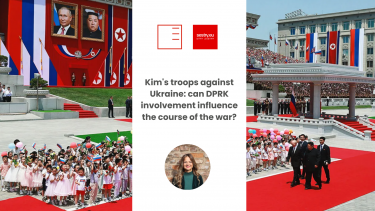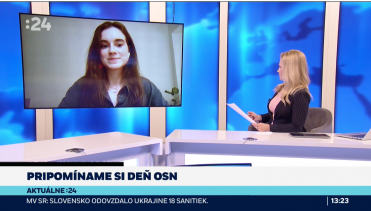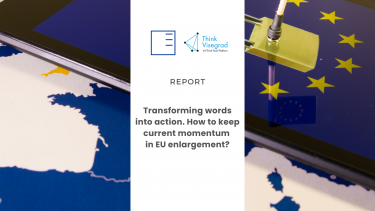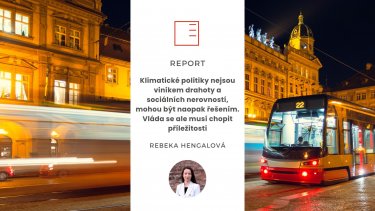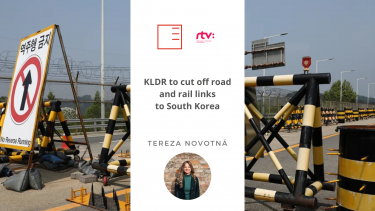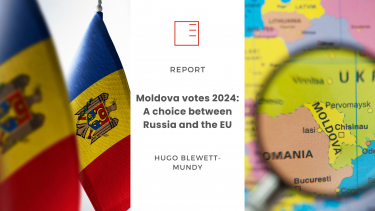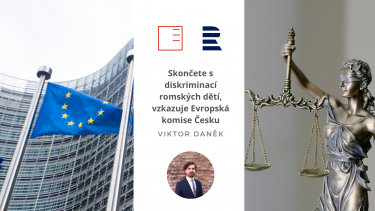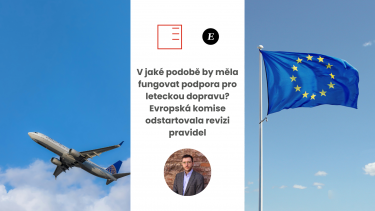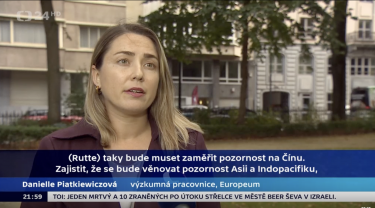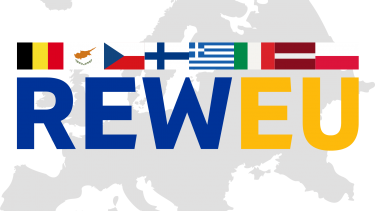Sestry.eu | Kim's troops against Ukraine: can North Korea's involvement influence the course of the war?
North Korea entered the war against Ukraine on Russia's side. Kiev expects an appropriate response from its partners. According to President Volodymyr Zelenskyj, there is evidence that not only workers but also military personnel are heading to Russia from North Korea. EUROPEUM Associate Research Fellow Tereza Novotná commented on the situation for Sestry.eu.
Show more
STVR | October 24 marks United Nations Day
United Nations Day has been celebrated since 1945 when the UN Charter came into force. Veronika Novotná, EuropaSecura project coordinator at EUROPEUM Institute, commented for Slovak TV.
Show more
Report | Transforming words into action. How to keep current momentum in EU enlargement?
On the 3rd of October, Think Visegrad in Brussels, represented by the Brussels Office of EUROPEUM Institute for European Policy, organized a discussion titled "Transforming words into action. How to keep current momentum in EU enlargement?". Experts from think tanks, diplomatic missions and EU institutions dwelled into the renewed focus on EU enlargement, including the initiation of accession negotiations with Ukraine and Moldova, the formulation of new strategies and financial incentives for candidate states, and reinforced commitments from the EU. The key challenge moving forward is ensuring that this momentum is sustained and translated into concrete, transformative actions that deliver measurable results.
Show more
Report | Climate policies are not the culprit of high costs and social inequalities, but can be the solution. But the government must seize the opportunity
This week, the Government will discuss in the third reading an amendment to the Emissions Trading Act, which also includes so-called household allowances. Under ETS2, these will charge for emissions from road transport and local heating - so they can help invest in infrastructure, renewable energy and support socially vulnerable groups. EUROPEUM Institute research fellow Rebeka Hengalová and others write.
Show moreSTVR | KLDR to cut off road and rail links to South Korea
KLDR has closed all roads connecting the country with South Korea. It accuses it of escalating tensions and has officially designated it as an enemy state. South Korea, on the other hand, warns the KLDR against reckless steps that could lead to the end of its authoritarian regime. Tereza Novotná, associate fellow of EUROPEUM Institute, commented for Slovakian Radio STVR.
Show more
Report | Moldova votes 2024: A choice between Russia and the EU
Moldova stands at a critical juncture that will determine its position within Europe. In the elections on Sunday, the incumbent president Maia Sandu is seeking a second term and a positive result in the EU accession referendum to reaffirm her country’s path towards Europe. But the hybrid threat facing Moldova from Russia will not dissipate, particularly as next year’s pivotal parliamentary elections approach in the tiny former Soviet republic. Hugo Blewett-Mundy, a non-resident associate research fellow from EUROPEUM, analyses the current situation in Moldova and provides an outlook for the country in 2025.
Show moreČeský rozhlas | End discrimination against Roma children, says the European Commission to the Czech Republic
According to the European Commission, the Czech Republic is not complying with EU legislation on combating racial and ethnic discrimination. Brussels has therefore initiated infringement proceedings. It claims that the Czech Republic is not effectively addressing the problem of segregation of Roma children in schools. Deputy director at EUROPEUM Institute Viktor Daněk commented for Český rozhlas.
Show moreEkonomický deník | How should support for air transport work? The European Commission has launched a review of the rules
The European Commission opens a debate on aviation support in the coming years. The new rules should start to apply after 2027. In particular, the guidelines are intended to minimize negative effects on competition and aim to preserve connectivity. Project coordinator and analyst at EUROPEUM Institute Filip Křenek commented for Ekonomický deník.
Show more
ČT24 | New Secretary General Rutte assures Ukraine of NATO support
The newly elected NATO Secretary General Mark Rutte went on his first working visit to Ukraine. He assured President Volodymyr Zelensky that he wants member countries to continue to support Ukraine and strengthen defense. Experts say they don't expect a change in the direction of the North Atlantic Alliance with the new chief, while warning that under the circumstances it will be the most difficult for him to keep the alliance together. For ČT24 comments Research Fellow at EUROPEUM Institute Danielle Piatkiewicz.
Show moreREWEU
The project (Re)uniting the East and West: Reflections on the 2004 EU enlargement (REWEU) is focused on the commemoration of the 2004 “big bang” EU enlargement at the occasion of its 20th anniversary in May 2024. This event had numerous positive effects on shaping Europe as we know it today, boosting its security, economic potential, and spreading democracy, good governance and European values across the European continent.
Show moreStaroměstské náměstí 4/1
Prague 1 - Staré Město
110 00
tel.: +420 212 246 552
email: europeum@europeum.org
https://www.europeum.org
